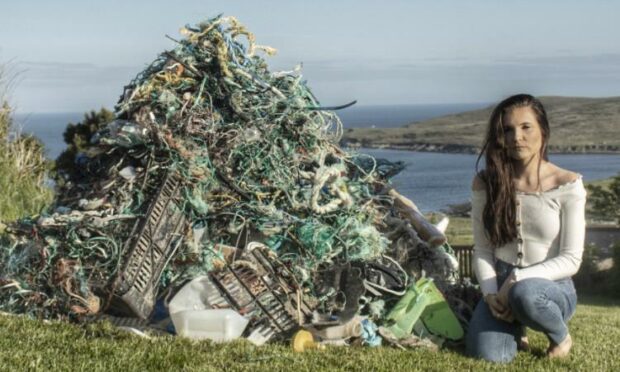More than a tonne of marine litter has been collected by Shetland residents in just two weeks following a community clean up challenge by islanders.
A total of 218 people signed up to take part in the Clean Up Challenge which was arranged by Shetlander Ellie Duncan.
Ms Duncan said that she wanted to start the project to highlight the extent of marine plastic pollution which is washed ashore on Shetland’s coastline.
Making litter picking less daunting
As a keen photographer and small ceramics business owner, Ms Duncan spends a lot of her time travelling around Shetland and focuses much of her work on the sea.
“Over time I have become increasingly aware of the amount of marine waste to be found along Shetland’s shores and the impact this is having on wildlife,” she said.
Determined to make a difference, she founded the Clean Up Challenge and has been thrilled to see Shetlanders of all ages embrace the initiative.
“There were over 300 litter cleans that took place from the community within the project,” said Ms Duncan, “I was blown away by the efforts of so many really going for it.
“It was fantastic to see so many children getting involved, their determination is admirable.
“As I was doing litter picks myself it really highlighted to me the extent of marine plastic pollution to be washed ashore on our beautiful coastline, the task is certainly less daunting when in a group of you.”
Shetland is ‘worse than anywhere’ for marine litter
Shetlanders are certainly no strangers to litter picking. The annual Da Voar Redd Up is the UK’s most successful community litter pick, with over 20% of Shetland’s population volunteering their time each year.
The islands also claim the less pleasant title of being among the worst places in the world for marine litter.
Ms Duncan said though that despite the obvious benefits of collecting rubbish, the root causes still remain.
“Doing beach cleans alone without stopping the source is like bailing water out of a sinking ship without mending the holes to prevent water getting into the vessel,” she said.
“Life can be very busy and stressful, especially the past year, for some I think that the thought of changing habits may seem quite daunting but making one simple plastic-free switch at a time that works best for an individual is fantastic.
“It falls on every single one of us to make the effort to help halt this threat to our marine environment.”
She is far from alone in feeling this way. Throughout lockdown, individuals and communities across Scotland have been working particularly hard not just to clean up their local beaches but to bring attention to the scale of marine pollution.
To read more about the thankless work being done by coastal communities to tidy up our shores, check our new Beach Clean Champions series.
